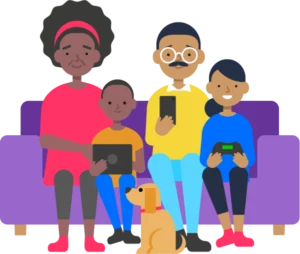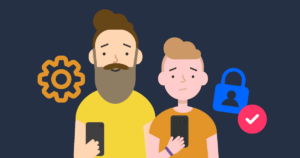Online issues impacting neurodivergent children
Neurodivergent children face more benefits and risks online than other kids. Learn about the common issues and learn how to deal with them.
What issues do neurodivergent children face online?
Children with additional needs often face greater risks online than other children. So, it’s important to stay on top of these issues and give them the tools to stay safe.
Explore the different issues they might face by choosing one of the following sections or scrolling down.
Sexting and sexual abuse
It’s common for young people to talk about sharing sexual images. Unfortunately, this can make them think that it is expected or normal to send nudes in romantic relationships.
While it’s not widely done among young people, neurodivergent children and those with disabilities are consistently more likely to share sexual images.
Some young people say they want to share these images. However, many face pressure to share sexual images with strangers, peers from school or friends. To fit in or avoid making someone angry, children might share these images even if they don’t want to. This is sexual coercion.
Some children – especially teen boys – face risk of sextortion as well. This is where an abuser uses a sent image to extort money, more images or something else from the victim. They usually threaten to share the images publicly if the victim doesn’t comply. Learn more about sextortion here.
- Encourage and help your child to immediately block and report the abuser.
- Reassure your child and let them know it isn’t their fault. Your main concern is their safety, so you want to help them
- Have calm and open conversations to explore what is happening in an honest and supportive way.
- Avoid intrusive or pressuring questions. Instead, focus on understanding how they are feeling now and what they might like from you.
- Check that the abuse has definitely stopped. Often, abuse continues even after a child or young person has told someone about it.
You can help prevent harm from sexting or sexual abuse with regular conversations as well. Talk about what sexual abuse looks like and what to do if they’re not sure (such as asking you).
Grooming and exploitation
While most people your child talks to online are harmless, some are not. Predators use popular online platforms to build a trusting relationship with children. Once they have that trust, they can then manipulate a child’s emotions to groom them.
Grooming is often for sexual purposes. However, some abusers might groom a child for criminal or extremist purposes too.
In some cases, a groomer might arrange to meet a child in person. Some neurodivergent children might struggle to recognise the risk. Instead, they believe the groomer is a friend. Because they think they know the stranger well, they might feel like they are safe.
- Regularly check-in with your child about who they talk to. If someone concerns you, ask your child about who the person is to understand the online friendship.
- Block and report anyone that concerns you and explain to your child why this is necessary.
- Try to keep devices such as video games consoles and computers in a common area like the kitchen or living room.
- Discuss what they should and shouldn’t share online (even if they trust that person). This includes sexual images and private information such as location, school or full name.
- Talk about consent and empower them to say ‘no’ if something makes them feel uncomfortable. Encourage them to come to you when this happens so you can support them.
- Discuss safe ways to explore their feelings online to avoid making them feel bad about seeking affection online.
- Together, create a plan for where they can go if they need help or are worried about something online. This could include talking to you or using platform tools. You might also encourage them to use Childline or Ditch the Label to talk with others.
- Review their communication permissions on the platforms they use. You can often customise who can contact them, who can add them as a friend and who can send private messages.
Cyberbullying
For neurodivergent children and those with disabilities, cyberbullying can take different forms. This can include relationships that are manipulative, exploitative or conditional.
Manipulative relationships: Your child might feel like the bully is their friend. As such, they might do things that the bully says because they want to stay part of the friendship group. In these cases, the bully recognises this power and uses it to their advantage.
Exploitative relationships: The bully might know your child well because they have always been in classes together. This means the bully knows what to say or do to make your child upset or angry for their entertainment. At school, they might do this to get the victim in trouble.
Conditional relationships: Your child might believe they have a close relationship with the bully. However, the bully will often use this closeness to demand things from them – often in secret. If the victim doesn’t comply, then the bully might threaten to end the friendship.
Neurodivergent young people are more likely to experience cyberbullying than those without additional needs. Additionally, children regularly report that cyberbullying has a very negative impact on their wellbeing.
- Talk about the people they communicate with online and whether they’re from school.
- Report any cyberbullying from your child’s peers to their school for support.
- Discuss what makes a good friend and what positive behaviours look like. Encourage your child to distance themselves from anyone who makes them feel upset.
- If your child is worried about losing friends, you might want to find activities to support more positive friendships. Maybe that’s enrolling them in an after-school club or finding a community outside of school.
- Together, discuss the signs of cyberbullying. Is the behaviour repeated? Does it make your child angry or sad? Remember to use examples that they can recognise. For example, does the bullying continue even after your child asked them to stop? This could help an autistic child recognise if something is intentional.
- Set up closed friendship groups on messaging apps or in video games. You can work with other parents to do this, creating a safe and positive space for your child to talk with others.
Oversharing
Many children like to share parts of their lives online. This might include posts about causes important to them or opinions on their favourite video game. As long as conversation stays positive, this is a great way for children to develop their identity and self-image.
However, some neurodivergent children might struggle with what is appropriate to share and what should stay private.
Sharing personal information can put young people at risk both online and offline. Information like where they live or images of them in their school uniform can make it easy for someone to find them offline. It could also put them at risk of online identity theft or grooming.
- Review their privacy settings to stay in control of what they share on the apps and platforms they use.
- Make social media profiles private. If your child signs up with their real birthdate between the ages of 13 and 16-18, many platforms do this automatically.
- Hide personal information on their accounts (e.g. remove pictures in front of your house or their school).
- If your child has a public profile, agree on ground rules around sharing and communication.
- Regularly review their friends list together to make sure they know who they’re sharing content with.
- Talk about personal information versus public information.
Peer pressure
Young people seeking acceptance online might take risks they otherwise wouldn’t. This is especially true for children with SEND. An example might be sharing a video of themselves taking part in a dangerous online challenge.
Regularly caving into peer pressure can normalise harmful behaviour. As such, they might not recognise when something is wrong. Peers who recognise this challenge for neurodivergent young people might exploit it and encourage your child to push their limits. Feeling pressure to take part in these behaviours ‘for a laugh’ can put their emotional wellbeing at risk.
Additionally, children with SEND are often more influenced by what they see online. So, exposure to forums that promote extreme risk can lead them to adopt values that can affect their behaviour and sense of self.
- Help them recognise when they feel pressured to do something. Do they actually want to do it? Or are they worried they will lose friends?
- If they recognise they don’t want to do something, encourage them to challenge it. This could include asking why they need to do something. Or, maybe it means explaining that what they’re being asked to do could lead to harm.
- Talk about your own experience to show that everyone faces peer pressure. Recognise that the online space just makes it a little harder to get away from.
- Make sure they know where to go for help if they’re not sure about something they’re being asked to do.
- Encourage them to talk with you first before taking part in any online challenge. Together, you can decide if it’s safe or how you can make it safer.
Tips to support your neurodivergent child
Help your neurodivergent child navigate the online space and potential risks safely with the ABCs of online safety.
Additional resources to find support

Get personalised advice and ongoing support
The first step to ensure your child’s online safety is getting the right guidance. We’ve made it easy with our ‘My Family’s Digital Toolkit.’










